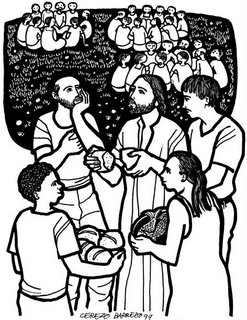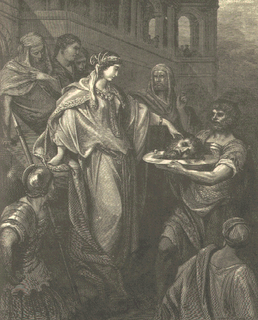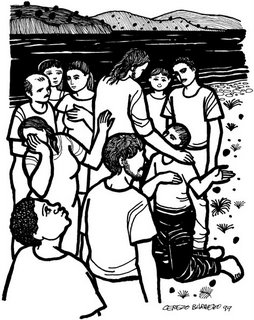
WESTMINSTER PRESBYTERIAN CHURCH
July 30th 2006
Rev. Mark R. Bradshaw-Miller
“Table Fellowship is…”
John 6:1-21
Some of you may have heard something about our most recent General Assembly. Maybe you heard about the Peace Unity and Purity report and all the controversy the report has generated. Maybe you have heard or read the syndicated columnists who wrote about a report on the trinity. If you did not hear or read those columns you have fortunately missed out on some real ignorant journalism. I use the word ignorant because it is clear that those columnists could not have read the report and written what they did. If they bothered to read the report, they would have learned that it was actually quoting from John Calvin and the bible. Or, maybe this is the first time you have heard about any of this. Whatever the case may be, our plan this morning is to talk about a report which generated no press whatsoever.
The General Assembly approved a study paper which calls the denomination to do a two year discernment focused on the sacraments. The hope is that we will give the sacraments a more central place in our lives and serve a vital role in our communities. While Presbyterians do a good job crafting well written documents, we often fail at implementation. Fortunately, in the report, there are clear and simple suggestions which move from paper to practical action. It is a report which drew little attention, mostly because there was overwhelming agreement on the paper. It is hard to get peoples attention when the church actually agrees on something.
When I originally reviewed this report I was amazed at how Westminster was already doing many of them. But instead of patting ourselves on the back, it seemed like a prime opportunity to further emphasize that which is an important part of our community. As I sat down to plan worship for the next five weeks, I was struck how each one of the gospel readings connected with the sacrament of the Lord’s Supper. It became quickly evident that this might just be a leading of the Spirit. So beginning today and continuing over the next few weeks, we are going to focus on the sacrament of the Lord’s Supper.
To start with, I believe it makes sense to explain what we mean when we say sacrament. As I prepared for ordination four years ago, I remember preparing for the examination on the floor of the Presbytery. The answer I gave on that day was very short and was meant to get a passing grade without ruffling any feathers. I said: “A sacrament is a visible sign of God’s grace.” While that catch phrase helped me to pass the exam, I frankly think it does little to explain what a sacrament is and why it actually matters for the church.
Since I am now ordained and not worried about loosing my ordination, let me attempt a definition which might be a bit more helpful. A sacrament is a concrete way that we humans use, based on our best knowledge of Jesus life and commands, to remind, renew and be restored for our lives as disciples. In the reformed tradition, we do this two ways; in Baptism and at the Lord’s Supper. Each way uses very common things such as; water, bread, and juice or wine. It is hoped that these common elements will work to remind us that God works through ordinary things and people. We participate in these practices as a way to remember that we are part of something bigger than ourselves. However, despite our best attempts at a definition, we believe that the sacraments are a mystery which will always be just beyond our ability to fully explain them. So over the next few weeks we will spend time seeking to understand one of the great mysteries of our faith: The Lord’s Supper.
One hope of the report was that churches and the denomination might begin to recover the parts of our faith which unify us. Baptism and the Lord’s Supper, the sacraments, are meant to draw our focus on those things which we share in common. I believe this search for unity is admirable given the deeply divided state of our denomination and our country. After all, how refreshing would it be for faith communities to proclaim a faith which did not look like a political party at prayer? How refreshing would it be for faith communities to proclaim a faith where Republicans, Democrats and Independents would be welcome to partake in the Lord’s Supper? It really would be good news if faith communities could actually proclaim that the love of God in Christ is meant for all people not just those who look alike, think alike and vote alike. The sacraments of Baptism and the Lord’s Supper remind the followers of Jesus that our identity is first and foremost children of God and in this we can find unity, good news, and hope.
All four gospels include the story of the feeding of the five thousand. Each gospel tells this story in a slightly different way in order to emphasis different aspects. In John’s gospel it is clear that this scene is meant to connect it with the tradition of Moses. Jesus goes to the mountain which is meant to imitate Moses’ action. God meets Moses on the mountain and the people come to meet Jesus on the mountain. The gospel also emphasizes that this feeding occurs during the period of Passover. At the Passover, the people of Israel become the people of God. Their identity as a people is rooted in the Passover. Also, God provided manna in the wilderness so that the people would not die. John is clearly linking this encounter with the tradition of the past.
In the same manner, this passage lays the groundwork for the future. It is no accident that, once the food has been located, Jesus takes the bread, gives thanks and then distributes the bread. This pattern for feeding occurs at each feeding story in all four gospel stories. This pattern of feeding also occurs at the last supper. It is meant to prepare the hearers for what is to come. So this passage not only looks to the past but it is also meant to prepare and anticipate the future.
This is what we do when we gather at the table for communion. We proclaim our connection with the tradition by saying: “On the night that Jesus was arrested, he took the bread, broke it and said: ‘This is my body broken for you, do this in remembrance of me.’ In the same way after dinner Jesus also took the cup and said: ‘This cup is the cup of salvation, poured out for you and for the world. Do this in remembrance of me.’” And every time we gather at the table we also prepare and anticipate the future. This is emphasized when we say: “For every time you eat this bread and drink this cup you proclaim the Lord’s death until he comes again, and come again he will.” Gathering at this table connects us with the past and leads us into the future. In doing this we foster and proclaim an identity that is bigger and more important than any other identity we might claim or which might be claimed for us. We really are all one in Jesus Christ, even if we have a hard time living it out, or claiming some of our brothers and sisters.
When we gather at this table we are called to remember whose we are. We gather at this table not because we have been ordered to by Jesus. Instead we gather at this table because graciously God has not left us to our own devises to find food in the surrounding villages. Again and again, we are invited to this table to be reminded of our identity. We are invited to this table to be inspired so we will go out and proclaim that there is room enough for everyone at Jesus table. No matter what or who may divide us out there, we are called to proclaim the new reality that all are welcome loved and affirmed at the welcome table of Jesus Christ. Amen.



